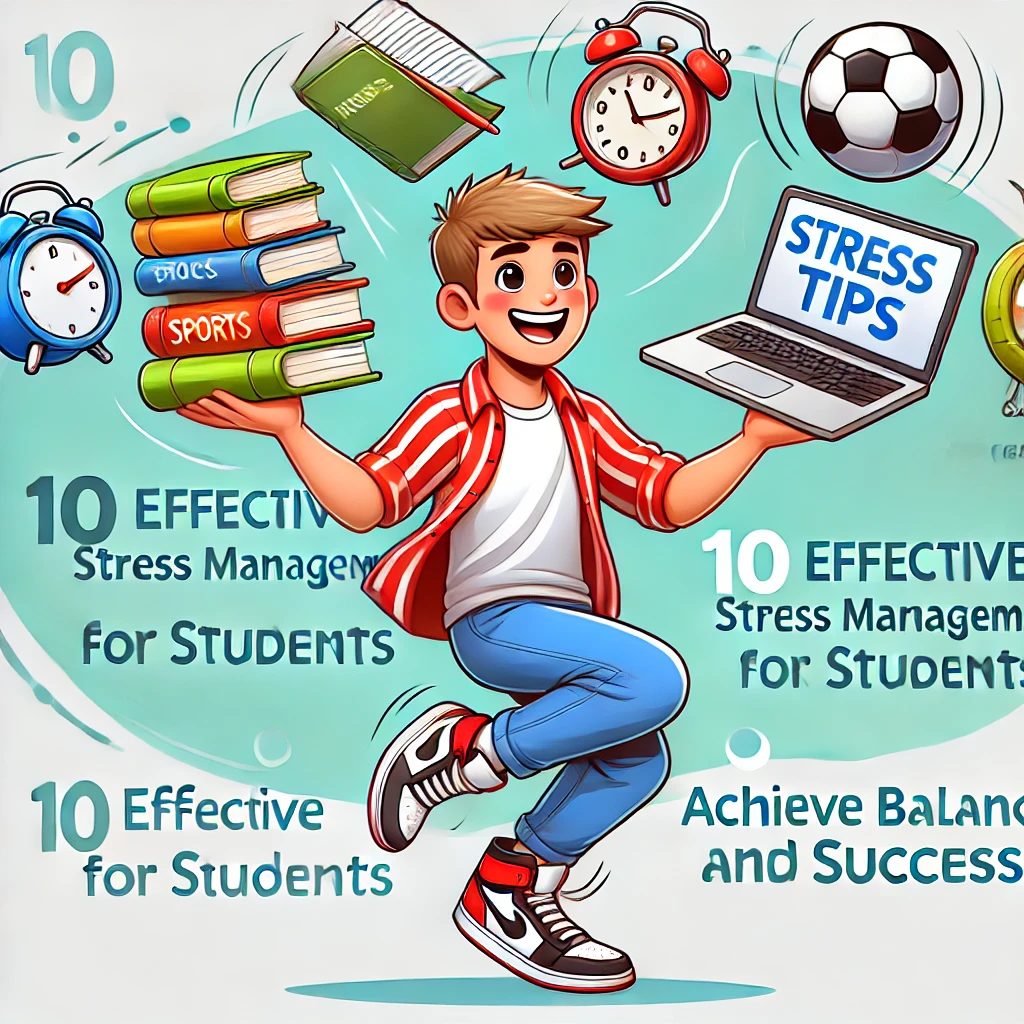Managing stress is crucial for students to maintain both mental and physical well-being. With exams, peer pressure, academic workload, and other challenges, stress can quickly become overwhelming. This guide offers practical and actionable stress management tips for students to help them navigate their academic journey with ease.
CARS LOVER CAN VISIT THIS SITE
- Sports Cars Under $10,000
- Sports Cars Under $8,000
- India’s First Sports Car
- Charm of 1970s American Cars
- Dodge Challenger SRT Hellcat
- Top 10 Ideal Cars for First-Time Buyers
- Skoda’s Superb Relaunch
- 10 Best New Sports Cars You Can Buy in 2024
- Japanese Sports Cars
Introduction
Stress management tips for students
are essential for ensuring academic success and personal well-being. Students face numerous stressors such as exams, assignments, and social pressures. This blog post provides practical tips to help students manage stress effectively, allowing them to maintain a healthy balance between school and personal life.
Identify Common Stressors
Academic Pressure
Academic pressure is a significant source of stress for students. Exams, assignments, and the constant push for good grades can lead to overwhelming anxiety. It’s essential to develop effective study habits and time management skills to mitigate this pressure. Explore our Study Techniques for more insights on stress management tips for students.
Social Challenges
Social interactions and peer pressure can also contribute to student stress. Navigating friendships, dealing with social expectations, and finding a sense of belonging are common challenges. It’s important to maintain healthy relationships and seek support when needed. Learn more about managing social stress in our Social Interaction Guide.
IF YOU LOE MUSIC THEN VISIT
- Best podcasts on Spotify
- Spotify pie
- Why does my Spotify keep pausing
- How To Connect Spotify To Alexa
- How See Who Likes Your Playlist
- How To Clear Your Queue on Spotify
- How To Connect Spotify to Discord
- Spotify playlist
Time Management
Balancing schoolwork, extracurricular activities, and personal time is another significant stressor. Poor time management can lead to last-minute cramming and missed deadlines, increasing stress levels. Discover our Time Management Tips to stay organized and productive. These stress management tips for students are crucial for maintaining balance.
Financial Concerns
Financial concerns, such as tuition fees, books, and living expenses, add to student stress. Managing finances effectively and seeking financial aid or scholarships can help alleviate this burden. For more advice, visit our Financial Management for Students. Implementing these stress management tips for students can reduce financial anxiety.
Actionable Stress Management Tips
Effective Study Techniques
- Break Study Sessions into Manageable Chunks (Pomodoro Technique)The Pomodoro Technique involves breaking study sessions into 25-minute intervals followed by a 5-minute break. This method helps maintain focus and reduces burnout. For a detailed guide, check out our Pomodoro Technique Guide. This is one of the most effective stress management tips for students.
- Use Active Learning Methods (Flashcards, Summarization)Active learning techniques such as flashcards and summarization enhance memory retention and make studying more engaging. Implement these methods for more effective learning. Learn more in our Active Learning Strategies.
Staying Organized
- Keep a Planner or Digital Calendar for Assignments and ExamsStaying organized is crucial for managing stress. Use a planner or digital calendar to keep track of assignments, exams, and deadlines. This helps you stay on top of your tasks and reduces last-minute stress.
- Declutter Study Space to Enhance Focus A clean and organized study space can significantly improve focus and productivity. Declutter your workspace to create an environment conducive to studying. For tips on organizing your study area, visit our Study Space Organization Guide. These stress management tips for students will help you stay focused and productive.
Healthy Lifestyle Choices
- Regular Physical Activity (Exercise, Sports)Regular physical activity, such as exercise or sports, helps reduce stress and improves overall well-being. Aim for at least 30 minutes of physical activity daily to stay healthy and manage stress effectively. For exercise ideas, explore our Fitness Tips for Students.
- Balanced Diet and Adequate SleepA balanced diet and adequate sleep are essential for maintaining energy levels and managing stress. Ensure you eat a nutritious diet and get at least 7-8 hours of sleep each night. For more advice on healthy eating, check out our Nutrition Guide for Students. These stress management tips for students will help you maintain a healthy lifestyle.
Relaxation Techniques
- Deep Breathing Exercises and MeditationDeep breathing exercises and meditation are effective relaxation techniques that help reduce stress. Practice these methods daily to calm your mind and improve concentration. Learn more in our Guide to Meditation and Relaxation.
- Practicing Mindfulness and YogaMindfulness and yoga promote mental clarity and relaxation. Incorporate these practices into your routine to manage stress better. For more information, visit our Mindfulness and Yoga Practices. These are essential stress management tips for students.
Seeking Support
- Talking to Friends, Family, or Counselors Sharing your concerns with friends, family, or counselors can provide emotional support and practical advice. Don’t hesitate to seek help when needed. For more resources, check out our Counseling Services Guide.
- Joining Study Groups or Support NetworksJoining study groups or support networks can provide academic assistance and emotional support. Collaborating with peers can also make studying more enjoyable. Learn more about forming study groups in our Study Group Guide.
Balancing School and Personal Life
- Setting Realistic Goals and PrioritiesSetting realistic goals and priorities helps manage expectations and reduces stress. Focus on what’s most important and break tasks into manageable steps. For goal-setting strategies, visit our Goal Setting for Students.
- Making Time for Hobbies and Social ActivitiesBalancing schoolwork with hobbies and social activities is crucial for maintaining mental health. Make time for activities you enjoy to relax and recharge. For ideas on balancing life and school, check out our Work-Life Balance Tips.
Conclusion
Managing stress is vital for students to achieve academic success and maintain overall well-being. By implementing these stress management tips for students, they can better navigate the challenges they face and maintain a healthy balance between school and personal life. Remember, stress management is an ongoing process, and finding what works best for you is key.
FAQs about Stress Management Tips for Students
- What are some effective study techniques for reducing stress?
- Breaking study sessions into manageable chunks and using active learning methods can help reduce stress.
- How can students stay organized to manage stress?
- Keeping a planner or digital calendar and decluttering the study space can help students stay organized and manage stress.
- What lifestyle choices can help manage stress?
- Regular physical activity, a balanced diet, and adequate sleep are essential for managing stress.
- What relaxation techniques are effective for students?
- Deep breathing exercises, meditation, mindfulness, and yoga are effective relaxation techniques.
- How can seeking support help manage stress?
- Talking to friends, family, or counselors and joining study groups can provide emotional and academic support.
- How can students balance school and personal life?
- Setting realistic goals and priorities, and making time for hobbies and social activities can help balance school and personal life.
Additional Resources
For further reading and tools related to stress management tips for students, consider exploring the following resources:
- American Psychological Association
- National Institute of Mental Health
- Mayo Clinic Stress Management
if you love stories then visit:


